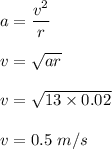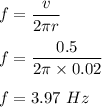
Physics, 11.11.2020 17:50 ashleyroberson735
An object that moves in uniform circular motion has a centripetal acceleration of 13 m/s^2 . If the radius of the motion is 0.02m, what is the frequency of motion?

Answers: 1


Other questions on the subject: Physics

Physics, 21.06.2019 21:30, katheline1226
In a load, the load is paralel to the shaft. n a. angular n b. thrust n c radial n d. none of the above
Answers: 1


Physics, 22.06.2019 00:00, hlhunter11p8f0o0
An object moves from the position +34m to the position -15m in 15 seconds. what is it's total displacement? what is it's average velocity?
Answers: 1

Physics, 22.06.2019 07:30, anonymous1813
Some material consisting of a collection of microscopic objects is kept at a high temperature. a photon detector capable of detecting photon energies from infrared through ultraviolet observes photons emitted with energies of 0.3 ev, 0.5 ev, 0.8 ev, 2.0ev, 2.5ev, and 2.8ev. these are the only photon energies observed. (a) draw and label a possible energy-level diagram for one of the microscopic objects, which has four bound states. on the diagram, indicate the transitions corresponding to the emitted photons. explain briefly. (b) would a spring–mass model be a good model for these microscopic objects? why or why not? (c) the material is now cooled down to a very low temperature, and the photon detector stops detecting photon emissions. next, a beam of light with a continuous range of energies from infrared through ultraviolet shines on the material, and the photon detector observes the beam of light after it passes through the material. what photon energies in this beam of light are observed to be significantly reduced in intensity (“dark absorption lines”)? explain briefly.
Answers: 3
You know the right answer?
An object that moves in uniform circular motion has a centripetal acceleration of 13 m/s^2 . If the...
Questions in other subjects:

Physics, 20.11.2020 09:20



Social Studies, 20.11.2020 09:20




Mathematics, 20.11.2020 09:20


Physics, 20.11.2020 09:20







